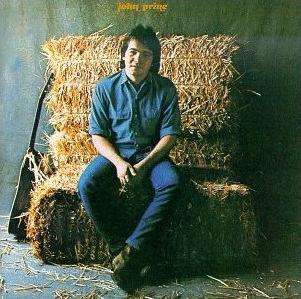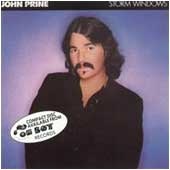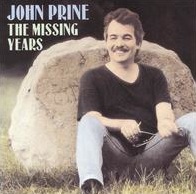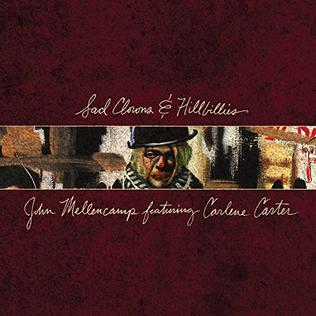
David Allan Coe is an American singer and songwriter. Coe took up music after spending much of his early life in reform schools and prisons, and first became notable for busking in Nashville. He initially played mostly in the blues style, before transitioning to country music, becoming a major part of the 1970s outlaw country scene. His biggest hits include "You Never Even Called Me by My Name", "Longhaired Redneck", "The Ride", "Mona Lisa Lost Her Smile", and "She Used to Love Me a Lot".

John Edward Prine was an American singer-songwriter of country-folk music. Widely cited as one of the most influential songwriters of his generation, Prine was known for his signature blend of humorous lyrics about love, life, and current events, as well as serious songs about melancholy tales from his life. His songs would often have elements of social commentary and satire. He was active as a composer, recording artist, live performer, and occasional actor from the early 1970s until his death.

Dorothy Snowden "Dar" Williams is an American pop folk singer-songwriter from Mount Kisco, New York. Hendrik Hertzberg of The New Yorker has described Williams as "one of America's very best singer-songwriters."

Iris Luella DeMent is an American singer-songwriter and musician. DeMent's musical style includes elements of folk, country and gospel. She has been nominated for a Grammy Award twice.
A torch song is a sentimental love song, typically one in which the singer laments an unrequited or lost love, either where one party is oblivious to the existence of the other, where one party has moved on, or where a romantic affair has affected the relationship. The term comes from the saying, "to carry a torch for someone", or to keep aflame the light of an unrequited love. It was first used by the cabaret singer Tommy Lyman in his praise of "My Melancholy Baby".

"Danny Boy" is a song with lyrics written by English lawyer Frederic Weatherly in 1910, and set to the traditional Irish melody of "Londonderry Air" in 1913.

John Prine is the debut album by American country/folk singer-songwriter John Prine, issued by Atlantic Records in 1971. In 2012, the album was ranked number 452 on Rolling Stone magazine's list of the 500 greatest albums of all time. It was later ranked number 149 in a revised version of the list published in 2020.

Melba Joyce Montgomery is an American country music singer and songwriter. She is known for a series of duet recordings made with George Jones, Gene Pitney and Charlie Louvin. She is also a solo artist, having reached the top of the country charts in 1974 with the song, "No Charge". Born in Tennessee but raised in Alabama, Montgomery had a musical upbringing. Along with her two brothers, she placed in a talent contest which brought her to the attention of Roy Acuff. For several years she toured the country as part of his band until she signed with United Artists Records in 1963.
"The Trees They Grow So High" is a Scottish folk song. The song is known by many titles, including "The Trees They Do Grow High", "Daily Growing", "Long A-Growing" and "Lady Mary Ann".

Fair & Square is the 15th studio album by American folk singer-songwriter John Prine, released on Oh Boy Records in 2005. It was rereleased in 2007 as a vinyl double-LP with four more bonus tracks, and in 2008 those four tracks were rereleased as an EP.

Aimless Love is the eighth album by American folk singer and songwriter John Prine, released in 1984. It is his first release on his independent record label, Oh Boy Records.

Storm Windows is the seventh album by American folk singer and songwriter John Prine, released in 1980. It was his last release on a major label; he joined Al Bunetta and Dan Einstein to form Oh Boy Records, on which all his subsequent recordings were released.

Pink Cadillac is the sixth studio album by the American musician John Prine, released in 1979 on Asylum Records. The working title was Storm Windows, which Prine used for his next album.

Bruised Orange is the fifth album by American folk singer and songwriter John Prine, released on May 16, 1978.

Diamonds in the Rough is the second studio album by American country-folk singer-songwriter John Prine, released in 1972.

The Missing Years is the 10th studio album by American folk musician John Prine, released in 1991 on Oh Boy Records. It won the Grammy Award for Best Contemporary Folk Album. In July 2003 the label released a deluxe vinyl reissue of the album with a bonus track called "The Third of July" from Prine's appearance on the PBS concert series Sessions at West 54th in 2001.

German Afternoons is the ninth album by American folk singer and songwriter John Prine, released in 1986.
"You Never Even Called Me by My Name" is a song written by Steve Goodman and John Prine. Prine requested to be uncredited on the song, as he thought it was a "goofy, novelty song" and did not want to "offend the country music community". Goodman released the song on his eponymous 1971 debut album Steve Goodman to little acclaim. It was more famously recorded by country music singer David Allan Coe on his 1975 album Once Upon a Rhyme. It was the third single release of Coe's career and his first Top Ten hit, reaching a peak of number eight on the Billboard country singles charts. The song, over five minutes long, is known for its humorous self-description as "the perfect country and western song."

That's the Way Love Goes is the thirty-eighth studio album by the American country music singer Merle Haggard backed by The Strangers, released in 1983.

Sad Clowns & Hillbillies is the 23rd studio album by American singer-songwriter and musician John Mellencamp. It was released on April 28, 2017 by Republic Records. The album features significant contributions from Carlene Carter, who worked with Mellencamp on Ithaca, the movie he scored for Meg Ryan; she sang on the track 'Sugar Hill Mountain' for the soundtrack. Carter opened every show of Mellencamp's 2015–2016 Plain Spoken Tour.
















